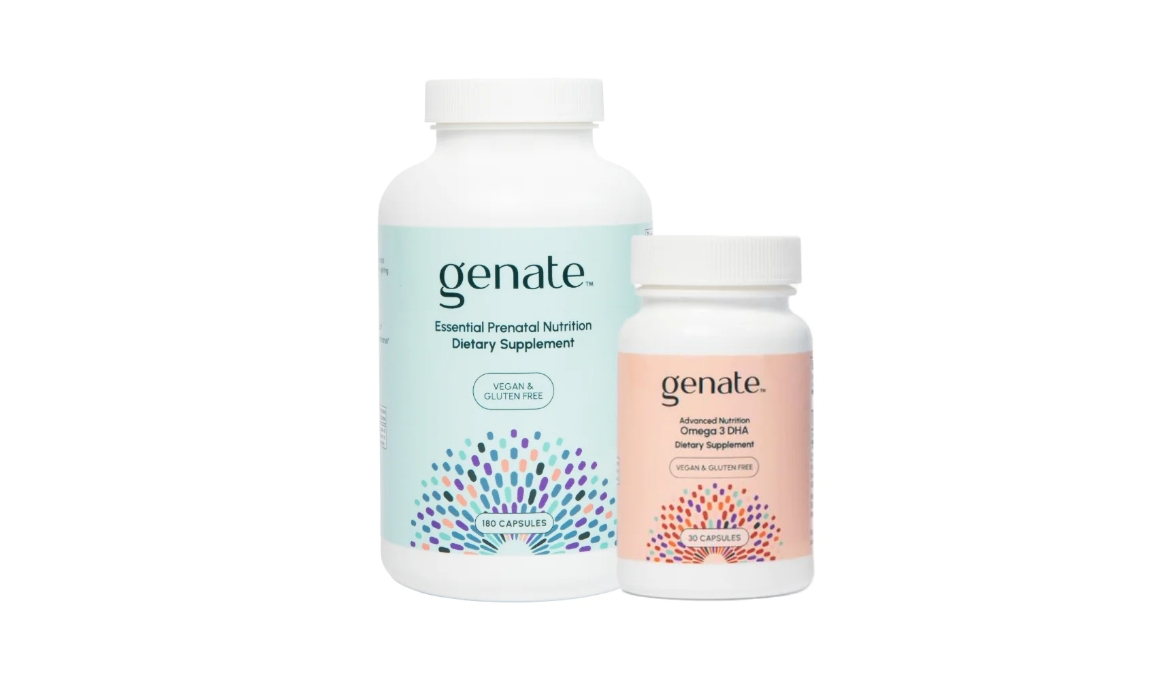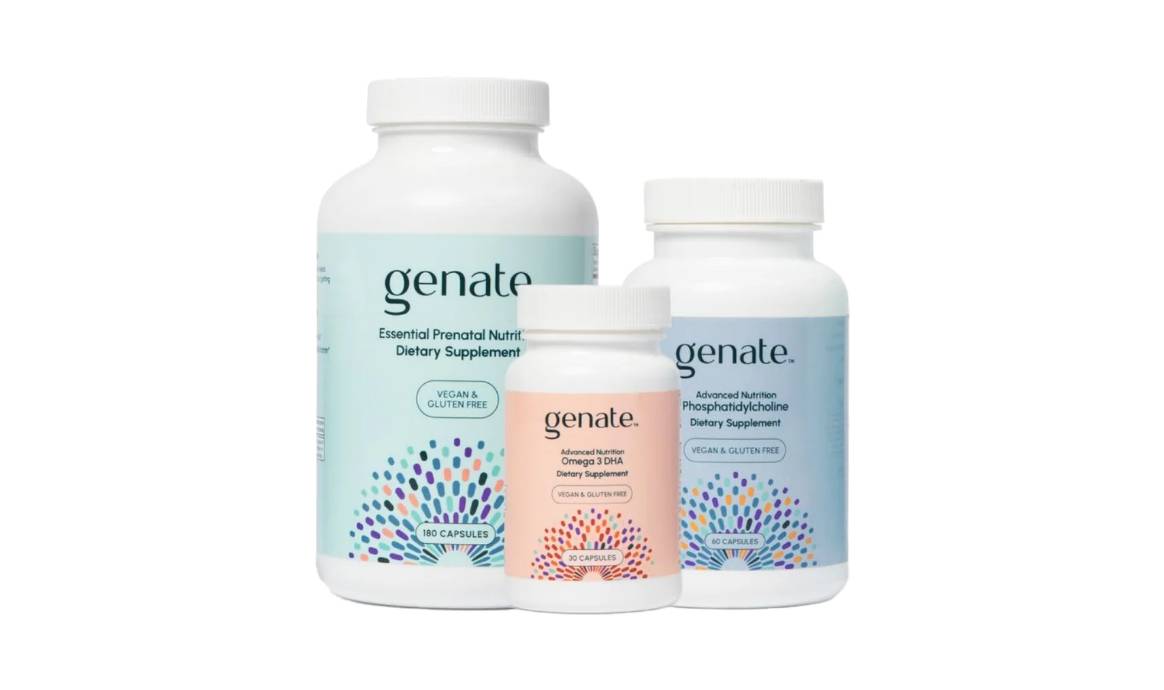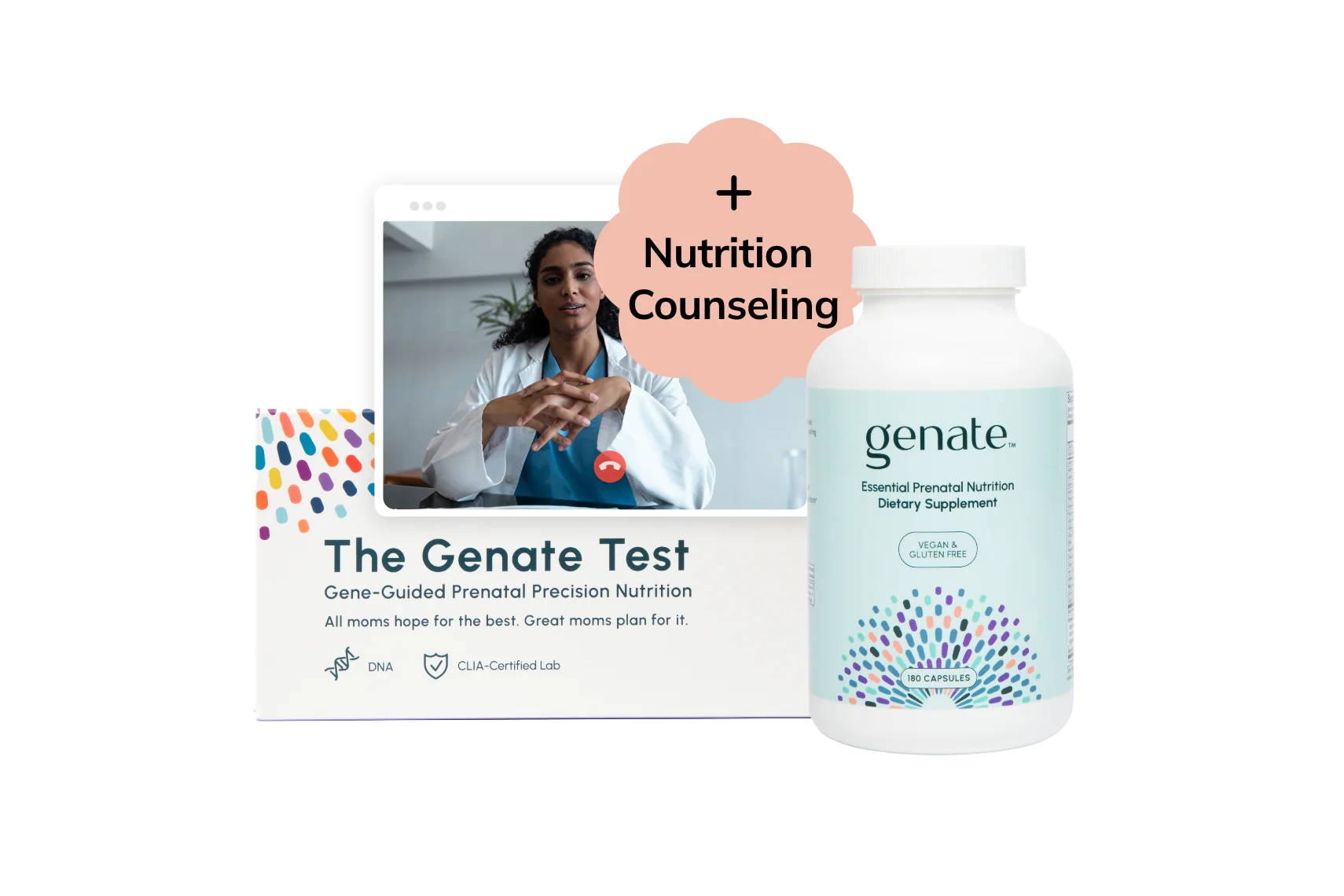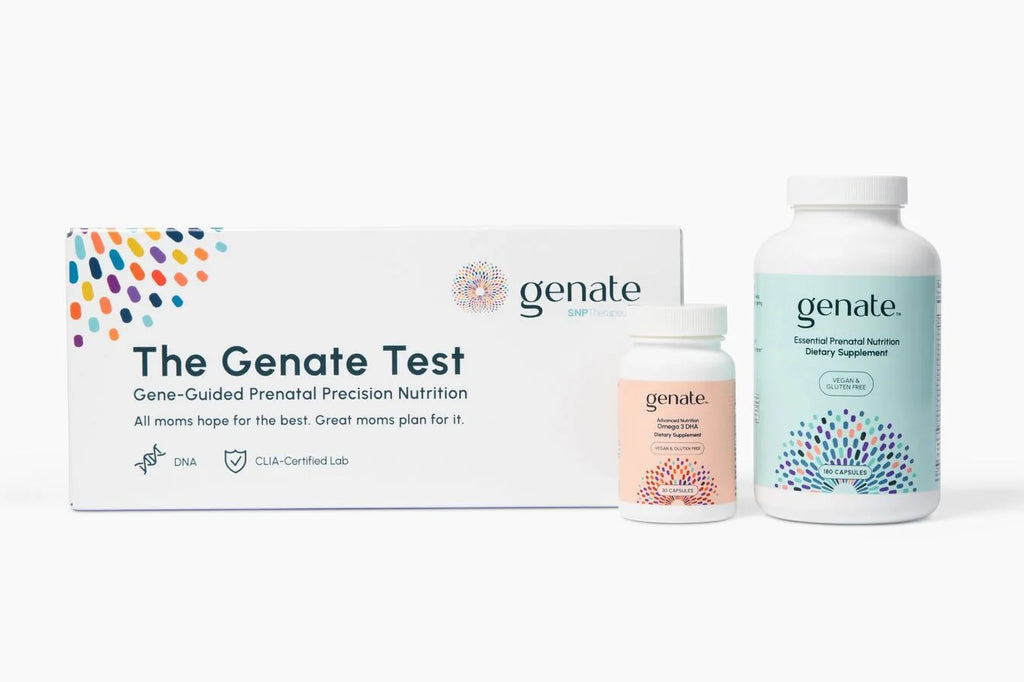Good nutrition is essential for every stage of your baby’s growth and development. But the efficiency with which your body metabolizes nutrients is partly determined by your genes, and common genetic variants can affect the metabolism of one-carbon nutrients that are critical for the development of your child’s brain and spinal cord. Genate Essential Prenatal Nutrition is a multivitamin formulated from academic research that provides women with a formulation optimized to support their baby’s cognitive development. It includes the one-carbon nutrients choline, betaine, methylfolate, and B vitamins that many women have trouble metabolizing and/or don’t get enough of in their diet.

DIET & NUTRITION
One-Carbon Metabolism & Dietary Sources of One-Carbon Nutrition
by Genate • May 12, 2023 • 6-8 minute read
What is One-Carbon Metabolism?
One-carbon metabolism is a critical process that plays a crucial role in the health of pregnant and breastfeeding women, as it is involved in the production of DNA and other molecules essential for fetal development and lactation.
During pregnancy and breastfeeding, the demand for nutrients – especially one-carbon nutrients – increases to support the growing fetus and provide adequate nutrition for the mother and baby. One-carbon metabolism becomes especially important during these periods, as it is necessary for the synthesis of DNA, which is essential for the development of the baby's genetic material.
What are One-Carbon Nutrients?
One-carbon nutrients are involved in many biological processes that are critical for the proper development of the brain, spinal cord, and nervous system. Your baby’s brain and nervous system grow rapidly before birth and in the first 1,000 days of their life, making the periods of pregnancy and breastfeeding a unique time for you to positively influence their cognitive development through your nutrition intake.
While you can easily obtain some one-carbon nutrients from foods, others are not as readily available or are typically not palatable to pregnant people. These nutrients can be provided through supplements to ensure adequate levels for your baby’s growth and development.
4 Sources of One-Carbon Nutrients
1. Choline
Recommended Adequate Intake (AI) of Choline:
- Non-Pregnant Women: 425 mg/day
- During Pregnancy: 450 mg/day
- After Pregnancy (Lactation): 550 mg/day
Choline is critical for the development of your baby’s brain, spinal cord, and nervous system for several reasons, one of which is that choline forms a primary component of cell membranes. It also plays an essential role in DNA formation, making choline a key nutrient for gene expression.
In addition, choline is an essential factor in the production of neurotransmitters, which are molecules that carry signals throughout the body from one cell to another. Without enough choline, people can have trouble with their memory, moods, control of their muscles, and other problems related to their brain and nervous system. Choline also has critical functions in gene expression and DNA formation.
Because of the many roles played by choline in cognitive growth and development, the body’s requirements for choline increases during pregnancy and breastfeeding. Low choline intake in mothers during pregnancy has been linked to lower scores on cognitive tests in their children that persist until at least age seven.
Choline and folate, another one-carbon nutrient, are dependent on each other in that both nutrients are used in the production of methionine. Methionine is an amino acid that is important for the synthesis of DNA. This helps explain why both choline and folate deficiencies in mothers have been found to raise the risk of neural tube defects in their infants.
In addition, if a woman has a folate deficiency (which can be caused by low intake or a genetic alteration that interferes with how the body uses folate), her body’s requirement for choline will increase.
Food Sources of Choline:
Choline is not a widespread nutrient in foods, and it isn’t included in most prenatal supplements due to the large size of the choline molecule. The best food sources of choline include beef (particularly beef liver), eggs, chicken, fish, soybeans, and dairy foods.
See the table below for these and other food sources that provide the highest levels of choline. (Source: National Institutes of Health)
| Food | Milligrams (mg) per serving | Percent DV % |
|---|---|---|
| Beef liver, pan fried, 3 ounces | 356 | 65 |
| Egg, hard boiled, 1 large egg | 147 | 27 |
| Beef top round, lean only, 3 ounces | 117 | 21 |
| Soybeans, roasted, ½ cup | 107 | 19 |
| Chicken breast, roasted, 3 ounces | 72 | 13 |
| Fish, Atlantic cod, cooked, 3 ounces | 71 | 13 |
| Potatoes, red, baked, flesh and skin, 1 large | 57 | 10 |
| Wheat germ, toasted, 1 ounce | 51 | 9 |
| Beans, kidney, canned, ½ cup | 45 | 8 |
| Quinoa, cooked, 1 cup | 43 | 8 |
| Milk, 1% fat, 1 cup | 43 | 8 |
| Yogurt, vanilla, nonfat, 1 cup | 38 | 7 |
| Brussels sprouts, boiled, ½ cup | 32 | 6 |
| Broccoli, chopped, boiled, drained, ½ cup | 31 | 6 |
2. Folate
Recommended Daily Intake (RDI) for Folate:
Pre-Pregnancy: 400 mcg/day
During Pregnancy: 600 mcg/day
After Pregnancy (Lactation): 600 mcg/day
This one-carbon nutrient is one of the B vitamins. Folate is known for helping to prevent neural tube defects, and it is critical throughout pregnancy but especially in the first trimester, when the neural tube is forming. This is reflected in recommended daily intakes for folate, which increase from 400 mcg/day to 600 mcg/day during pregnancy and lactation.
Folate is crucial for cell division (which occurs at a rapid rate in a developing fetus), nervous system growth and development, and the production of energy in the body. Alcoholism, folate disorders that cause poor absorption, and genetic alterations that affect the body’s metabolism of folate can all lead to low levels in the body.
Folate deficiency in pregnant women has been linked to higher rates of neural tube defects and poor cognitive function in their babies. (Source: Naninck et al., Adv Nutr, 2019)
Food Sources of Folate:
Folate is naturally found in a wide variety of foods. Those with the highest levels of folate include beef liver, dark green leafy vegetables, black-eyed peas, brussels sprouts, asparagus, and rice. Eating a varied diet that contains both plant and animal foods will ensure a consistent and adequate intake of this nutrient.
The synthetic form of folate, folic acid, is also added to prenatal supplements and some fortified foods. Most pasta, breads, and breakfast cereals are made with enriched wheat or corn flour, which has folic acid added to it. See the table below for the best food sources of folate and folic acid. (Source: National Institutes of Health)
| Food | Micrograms(mcg) per serving | Percent DV |
|---|---|---|
| Beef liver, braised, 3 ounces | 215 | 54 |
| Spinach, boiled, ½ cup | 131 | 33 |
| Black-eyed peas, boiled, ½ cup | 105 | 26 |
| Breakfast cereals, fortified | 100 | 25 |
| Rice, white, cooked, ½ cup | 90 | 22 |
| Asparagus, boiled, 4 spears | 89 | 22 |
| Brussels sprouts, boiled, ½ cup | 78 | 20 |
| Spaghetti, cooked, enriched, ½ cup | 74 | 19 |
| Lettuce, romaine, shredded, 1 cup | 64 | 16 |
| Avocado, raw, sliced, ½ cup | 59 | 15 |
| Spinach, raw, 1 cup | 58 | 15 |
| Broccoli, chopped, cooked, ½ cup | 52 | 13 |
| Mustard greens, boiled, ½ cup | 52 | 13 |
| Bread, white, 1 slice | 50 | 13 |
| Green peas, boiled, ½ cup | 47 | 12 |
| Kidney beans, canned, ½ cup | 46 | 12 |
| Wheat germ, 2 tablespoons | 40 | 10 |
3. Betaine
Betaine is related to folate in that both nutrients can act in the formation of methionine, an amino acid necessary for DNA synthesis. When the intake of folate is low, or the body’s levels are compromised due to genetic variations that interfere with folate metabolism, betaine needs rise even higher. This nutrient is also important for liver and kidney function as well as heart health. Betaine has been shown to lower cholesterol and blood lipid levels in animals with heart disease. (Source: Craig, ACJN, 2004)
Although betaine is an essential nutrient for cognitive function due to its role in DNA synthesis, there is no established recommended daily intake for this nutrient. Researchers have determined that 9–15 g/day of betaine is a safe range, but no minimum level has been established.
Food Sources of Betaine:
Data on betaine amounts in specific foods is limited compared to the amount of data available for other one-carbon nutrients. Although a comprehensive database does not exist as it does with many other vitamins and minerals, researchers have examined betaine levels in various foods to determine good sources of this nutrient.
Betaine is found primarily in shellfish (such as shrimp), enriched grain products, and certain vegetables, including beets and spinach. Research on this nutrient indicates that it is widespread among plants, animals, and other organisms, although the levels certainly vary among food sources. (Source: Craig, ACJN, 2004)
The list that follows includes the best food sources of betaine based on data available from laboratory analysis and clinical studies. (Sources: Cho et al., AJCN, 2008 and Zeisel et al., J Nutr, 2003)
The Best Food Sources of Betaine:
- Beef
- Spinach
- Beets
- Enriched pasta, white and wheat bread, and pretzels
- Enriched breakfast cereals
- Wheat bran
- Wheat germ
- Shrimp and other shellfish
4. Vitamin B12
Food Sources of Vitamin B12
| Food | Micrograms(mcg) per serving | Percent DV |
|---|---|---|
| Beef liver, pan-fried, 3 ounces | 70.7 | 2,944 |
| Clams (without shells), cooked, 3 ounces | 17 | 708 |
| Tuna, bluefin, cooked, 3 ounces | 9.3 | 385 |
| Nutritional yeast, fortified, ¼ cup | 8.3 - 24 | 346 - 1,000 |
| Salmon, Atlantic, cooked, 3 ounces | 2.6 | 108 |
| Ground beef, 85% lean, cooked, 3 ounces | 2.4 | 100 |
| Milk, 2% milkfat, 1 cup | 1.3 | 54 |
| Yogurt, plain, fat free, 6-ounces | 1.0 | 43 |
| Breakfast cereals, fortified with 25% DV B12, one serving | 0.6 | 25 |
| Cheese, cheddar, 1½ ounces | 0.5 | 19 |
| Egg, whole cooked, one large | 0.5 | 19 |
| Turkey, breast meat, roasted, 3 ounces | 0.3 | 14 |
One-Carbon Nutrient Applications for Pregnant and Breastfeeding Women
One-Carbon Metabolism in Closing
This article is not intended as medical advice to treat or diagnose any health condition but rather as educational health information for the general public. It should not be used as a substitute for individualized medical care from your healthcare provider.
Shop the Article
Save 23% today!
Genate Essential Prenatal Multivitamin + Advanced Omega-3 DHA Package
Bundle to increase savings and provide the foundational nutrients needed for optimal health and development.
From $72 per month
Save 23% today!
Comprehensive Prenatal Support Package
Genate Essential Prenatal Multivitamin + Advanced Omega-3 DHA + Phosphatidylcholine
Our most comprehensive bundle - you’ll receive our Essential Prenatal Multivitamin, Advanced Phosphatidylcholine, and Advanced Omega-3 DHA.
From $110 per month
Save 30% today!
Comprehensive Prenatal Nutrition Bundle
Buy the Genate Test and a nutrition counseling session with a Genate registered dietitian, and receive a 30-day supply of the Genate Essential Prenatal Multivitamin FREE. Purchase includes a 90-day prenatal multivitamin subscription at our best monthly price.
$309
Take the Genate Quiz
Take our Nutrition Quiz to learn more about your nutrition journey.
Read Our Latest Articles
Frequently Asked Questions
What are the benefits of my baby getting the proper nutrients?
What are one-carbon nutrients and fatty acids, and why are they important?
One-carbon nutrients and fatty acids are critical for brain and spinal cord development during pregnancy and through the first two years of life. Although all nutrients are important, the one-carbon nutrients choline, folate, betaine, and B vitamins, along with the omega-3 fat DHA, provide the building blocks for proper growth of your developing baby's brain. Research at Cornell and Harvard universities has shown cognitive benefits for children born to mothers who received increased levels of one-carbon nutrients during pregnancy, demonstrating that optimal nutrition during pregnancy can have lasting effects for your baby.
If I buy Genate nutrition supplements, do I still need to take the test?
Genetic testing is a personal choice, and only you can decide what’s best for you and your baby. But the Genate Test is a powerful tool for optimizing your nutrition status, as it identifies genetically-caused metabolic inefficiencies that may influence your body’ ability to make and use the nutrients critical for your baby’s cognitive development. If you have SNPs in any of the nutrient pathways tested, your Genate Report will provide personalized recommendations for optimizing your nutrition. Our registered dietitians can show you how to fill in the gaps with foods and supplementation, if needed, to make sure you’re getting the nutrition you and your baby need.








